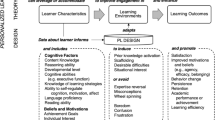Abstract
Two perspectives on the status of current research are offered: (1) In the past 15 years, the field has made extraordinary advances in the technical excellence of research studies, and yet (2) our analytical investment at the front end of research planning has not kept pace. An analysis of present problems is accompanied by two suggestions for future developments in instructional technology research: (1) we need to go beyond descriptive research methods and adoptprescriptive research methodology; and (2) researchers should seek broader and deeper knowledge of previous research in both instructional design and development before they conduct studies.
Similar content being viewed by others
References
Bruner, J. S. (1964). Some theorems on instruction illustrated with reference to mathematics.The sixty-third yearbook of the national society for the study of education, Part I, 63, 306–335.
Case, R. (1978). A developmentally based theory and technology of instruction.Review of Educational Research, 48, 439–463.
Case, R., & Bereiter, C. (1984). From behaviorism to cognitive behaviorism to cognitive development: Steps in the evolution of instructional design.Instructional Science, 13, 141–158.
Clark, R. E. (1983). Reconsidering research on learning from media.Review of Educational Research, 53(4), 445–459.
Clark, R. E. (1988). The future of technology in educational psychology. In M. C. Wittrock & F. Farley, (Eds.),The future of educational psychology. Hillsdale, NJ: Lawrence Erlbaum Associates.
Clark, R. E., & Salomon, G. (1986). Media in teaching. In M. C. Witttrock (Ed.),Handbook of research on teaching (3rd ed.). New York: Macmillan.
Clark, R. E., & Snow, R. E. (1975). Alternative designs for instructional technology research.AV Communication Review, 23, 373–394.
Clark, R. E., & Voogel, A. (1985). Transfer of training for instructional design.Educational Communication and Technology Journal, 33, 113–123.
Cook, T. D., & Campbell, D. T. (1979).Quasi-experimentation. Boston: Houghton Mifflin Co.
Cooley, W. W., & Lohnes, P. R. (1976).Evaluation research in education. New York: Irvington Publishers, Inc.
Cronbach, L. J. & Snow, R. E. (1977).Aptitudes and instructional methods. New York: Irvington Publishers, Inc.
Foster, S. F. (1986). Ten principles of learning revised in accordance with cognitive psychology: With implications for teaching.Educational Psychologist, 21, 235–243.
Glaser, R. (1976). Components of a psychology of instruction: Toward a science of design.Review of Educational Research, 46, 1–24.
Heinich, R. (1984). The proper study of instructional technology.Educational Communication and Technology Journal, 32, 67–87.
Kerlinger, F. N. (1977, September). The influence of research on education practice.Educational Researcher, 5–12.
Kulik, J., Bangert, R., and Williams, G. (1983). Effects of computer-based teaching on secondary school students.Journal of Educational Psychology, 75, 19–26.
Landa, L. N. (1983). Descriptive and prescriptive theories of learning and instruction: An analysis of their relationships and interactions. In C. M. Reigeluth (Ed.),Instructional design theories and models. Hillsdale, NJ: Lawrence Erlbaum Associates.
Merrill, M. D. (1983). Component display theory. In C. M. Reigeluth (Ed.),Instructional design theory and models. Hillsdale, NJ: Lawrence Erlbaum Associates.
Reigeluth, C. M. (1983).Instructional design theories and models. Hillsdale, NJ: Lawrence Erlbaum Associates.
Rumelhart, D. E., & Norman, D. A. (1981). Analogical processes in learning. In J. R. Anderson (Ed.),Cognitive skills and their acquisition. Hillsdale, NJ: Lawrence Erlbaum Associates.
Salomon, G. (1979).Interaction of media, cognition and learning. San Francisco, CA: Jossey Bass.
Simon, H. (1981).The sciences of the artificial (2nd ed.). Cambridge, MA: MIT Press.
Snow, R. E. (1977, November). Individual differences and instructional theory.Educational Researcher, 11–15.
Snow, R. E., & Lohman, D. F. (1984). Toward a cognitive theory of learning from instruction.Journal of Educational Psychology, 76, 347–376.
Author information
Authors and Affiliations
Rights and permissions
About this article
Cite this article
Clark, R.E. Current progress and future directions for research in instructional technology. ETR&D 37, 57–66 (1989). https://doi.org/10.1007/BF02299046
Issue Date:
DOI: https://doi.org/10.1007/BF02299046



